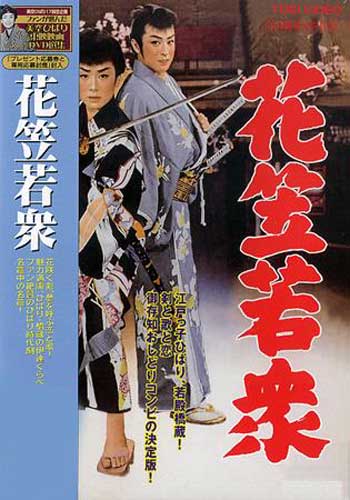Hibari-san's Gender-Bending Chambara
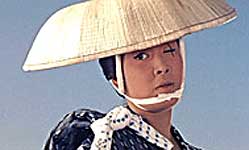
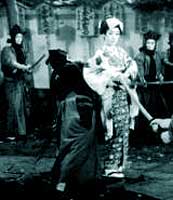 This chambara musical Kobanzame-oyakushi jingi (Vengeance, 1965) stars Hibari Misori in two great roles, as Yukinojo of Osaka (an onna-kabuki actress on a mission of revenge) & as Oshichi the girl acrobat. This chambara musical Kobanzame-oyakushi jingi (Vengeance, 1965) stars Hibari Misori in two great roles, as Yukinojo of Osaka (an onna-kabuki actress on a mission of revenge) & as Oshichi the girl acrobat.
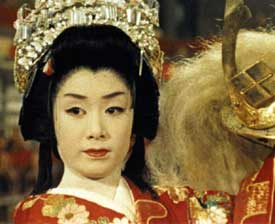 It co-stars Eitaro Shindo as the villainous Doi & Yoichi Hayashi as Yamitaro. It co-stars Eitaro Shindo as the villainous Doi & Yoichi Hayashi as Yamitaro.
Near the end of the film Hibari performs a superb kabuki sword dance beautifully choreographed (several of her films include "theatrical" pieces within the stories, frequently as part of the climactic action).
The gender-bending nature of the role is only half spoiled by having an actual woman play Yukinojo, who in the original story is an onnagata (male specialist in female roles) rather than a member of a women's troupe. Kon Ichikawa filmed it most famously as Yukinojo henge (An Actor's Revenge, 1963).
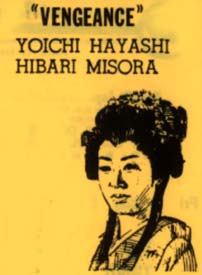 On the other hand, because Hibari was a half-out-of-the-closet lesbian, she took this very "girls will be boys who will be girls" sort of role repeatedly. On the other hand, because Hibari was a half-out-of-the-closet lesbian, she took this very "girls will be boys who will be girls" sort of role repeatedly.
And in a poignant moment of the film, when she is acting to herself, Oshichi the acrobat says to Yukinojo, "You went boating with Lady Ran on that romantic night" which admits to the love-interest between Ran & Yuki just as is implied in the original story.
I suggest Hibari was only "half out of the closet" because her gay fan base certainly knew what the general public merely suspected or closed their minds to.
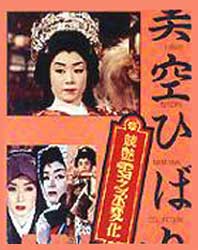 I saw a filmed interview with Hibari in a gay bar with her girlfriend in full male drag (Hibari was bar-hopping with the then-starring "male" lead of the Takarazuka all-girl theater), & they were being waited on, catered to, & giggled at by a group of horribly ugly Japanese drag queens in full geisha regalia. I saw a filmed interview with Hibari in a gay bar with her girlfriend in full male drag (Hibari was bar-hopping with the then-starring "male" lead of the Takarazuka all-girl theater), & they were being waited on, catered to, & giggled at by a group of horribly ugly Japanese drag queens in full geisha regalia.
The interviewer asked, "Why did you never marry?" And as all the queers leaned in to hear her answer, she drew a long breath & spoke with her best yakuza butch affectation, saying she had made her career her only husband & though she would have liked to have married, no man could compete with her career.
She did marry late in life, but was soonafter divorced. And the real answer to the question posed in that gay bar would've been "Cuz I'm a dyke." But this was well before a time of gay liberation & the fact that she would do this interview in a gay bar while on a date with a tall gorgeous gal in male drag said so much more than was permitted to be vocalized.
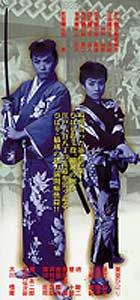 Kobanzame-oyakushi jingi was actually a remake of one of Hibari's early musicals, when she was only twenty years old. Kyouen Yukinojo-henge (Retelling of "An Actor's Revenge") Toei, 1957) co-starring Tetsura Tamba, Youichi Numata & Katsuko Wakasugi. Eitaro Shindo played the villainous Doi as in both versions. Kobanzame-oyakushi jingi was actually a remake of one of Hibari's early musicals, when she was only twenty years old. Kyouen Yukinojo-henge (Retelling of "An Actor's Revenge") Toei, 1957) co-starring Tetsura Tamba, Youichi Numata & Katsuko Wakasugi. Eitaro Shindo played the villainous Doi as in both versions.
In this tale, Doi attempted to use his daughter to achieve power in the castle, a plan ruined by Yukinojo. This one was an epic-length three hours during which Hibari plays three roles rather than "only" two. A small black & white still is reproduced at the head of this section from this film.
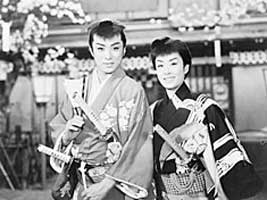 Hibari didn't invariably select gender-bent roles, but she did it often enough for it to clearly be a trademark. It was additionally her trademark to do those double roles in a great many of her films. Hibari didn't invariably select gender-bent roles, but she did it often enough for it to clearly be a trademark. It was additionally her trademark to do those double roles in a great many of her films.
In Hanakasa wakashu (Young Man in a Flowered Hat; or, Flowered Hat of Youth, or A Martial Crowd, Toei, 1958) she plays a dashing wakashu or young man, the word generally implying homosexual youth.
Since she is in disguise "he" & her slightly hunkier (but still awfully pretty) wakashu companion aren't actually the gay couple they appear to be.
This is the double-whammy of gender bending that Hibari's fandom expected. Her co-star is Hashizo Okawa in a detective-samurai role. Hashizo trained as an onnagata or female player in the kabuki theater, so there's an even wilder subtext of gender-bending going on. And it's always tough for even the prettiest leading lady to be prettier than Hashizo.
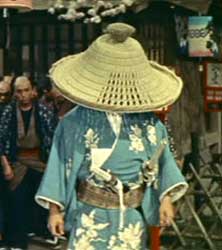 "He" is a happy-go-lucky songster for the "singing samurai" equivalent of America's "singing cowboy" films. "He" is a happy-go-lucky songster for the "singing samurai" equivalent of America's "singing cowboy" films.
Hanakasa wakashu really ought to be a classic but is almost unknown outside of Japan. When Hibari has a one-against-all duel, the choreography is great enough that the action is easy to take seriously, even if our wakashu swordfighter is singing a jaunty boogy-woogy tune! Hibari's swift & agile & just looks good with a sword. When she goes into one of her "tough talk" routines, it's amusing, but the male character she creates is a real likeable fellow in any case.
I almost said "a camp classic" & I suppose the term has to fit when you really think about the film's ingredients, but there are some very serious story elements that are anything but saccharine, & the presentation is as dramatically appealing as musicals ever get.
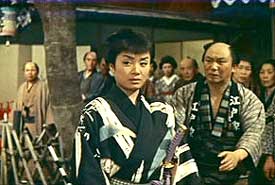 Having been raised as a boy by her mother, Kichiza never knew he was actually Yuki the twin sister of Princess Chiyo. Because twins were bad luck, the second one out of the womb was banished as a newborn, with her mother. Kichiza grew up living a carefree life as a peasant & became a chivalrous yakuza, unaware that he was actually a princess. Having been raised as a boy by her mother, Kichiza never knew he was actually Yuki the twin sister of Princess Chiyo. Because twins were bad luck, the second one out of the womb was banished as a newborn, with her mother. Kichiza grew up living a carefree life as a peasant & became a chivalrous yakuza, unaware that he was actually a princess.
The existence of Yuki has the potential of interfering with a nefarious plot against Princess Chiyo, & some castle samurai begin nosing about trying to find out what became of the other twin. Resultant machinations result in the murder of Yuki/Kichiza's father (Denjiro Okochi)
She reprised the wakashu young man role in A Young Rabble (Irowa wakashu furisode zakura 1959). This time "he" is a toseinin or wandering gambler.
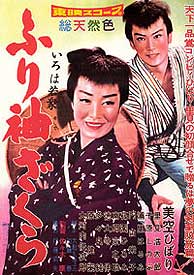 Having been a naive young yakuza of Edo making a little extra cash for gambling by singing at a shrine, a local gang boss demanded Kikutaro get his permission, & pay a kickback, for permission to do business buy by the shrine. Kikutaro balks at the protection racket & starts a brawl with the gangsters. When the police intervene, it is decided that both the yakuza boss & young Kikutaro should be banished from Edo until tempers cool. Having been a naive young yakuza of Edo making a little extra cash for gambling by singing at a shrine, a local gang boss demanded Kikutaro get his permission, & pay a kickback, for permission to do business buy by the shrine. Kikutaro balks at the protection racket & starts a brawl with the gangsters. When the police intervene, it is decided that both the yakuza boss & young Kikutaro should be banished from Edo until tempers cool.
Kikutaro's father warns him, "You're not like other sons," which makes the young man's tough mood momentarily distraught. His father had been a yakuza when a young man, & knows that Kikutaro is headed down a bad road. Since the lad is banished from Edo for a while anyway, his father sends him to stay with the gambling boss Gimbei the Saint (Denjiro Okochi), who will be able to provide lessons about the gambling world that may open Kikutaro's eyes.
Along the road, singing gaiely as he goes, Kikutaro meats another "warbler," Genta (Kotaro Satomi) & as both have been robbed by the same lady pickpocket (Hiromi Hanazono), they soon bond during an effort to raise new travelling funds. They have a contest to see who can raise the most money singing, & the winner gets to be the boss or oyabun, the loser gets to be the henchman. Thus Genta becomes Kikutaro's henchman. Among many wonderfully endearing scenes is Kikutaro's attempt to teach Genta a proper yakuza ritual greeting.
Gimbei is a good yakuza boss who runs a fairly above-board gambling enterprise, but he has a rival for the territory who runs local prostitution & will stop at nothing to take over the gambling to add to his prostitution. A banished yakuza boss from Edo comes to stay with this rival boss, bringing many of his men with him, so the time is right to move against Gimbei.
The lady pickpocket Oroku has raised funds sufficient to redeem the indenture contract of her sister Osuzu (Chihara Shonobu), but the newly strengthened bad yakuza boss won't let the young woman go, having promised her to the oyabun from Edo. Thus Kikutaro finds he must liberate a young woman from a forced marriage, & avenge Gimbei the Saint.
Kikutaro has believed the yakuza world is where "a man's man" belongs, in order to help the weak, but he's learned from Gimbei on the old oyabun's last breath that the yakuza world is a place of corruption & betrayal & cowardly murders. Captured along with Genta & awaiting their own deaths, Genta says there's a way Kikutaro can get them out of the situation, "But first you will have to return to your true form."
Only then does Kikutaro realize his friend Genta has known almost from the beginning of their friendship that this young man was a girl. She explains, "It was my father's whim that I be raised as a boy because he wanted a son. Later, it was my whim." But now she must become the beautiful Okiku in order to take Suzu's place in the forced marriage, & spring herself upon the bad yakuza in revenge raid.
This is a family film foremost, exceedingly well played & charming as can be. Hibari's in top form in a male or androgynous role, has excellent if family-friendly bloodless duels, & a delightfully perverse romance with her young leading man Kotaro Satomi.
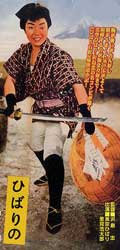 Tomboy Samurai (Onnazamurai tadaima sanjo, Shochiku, 1958) was directed by Kunio Watanabe. It stars Hibari opposite Jushiro Konoe. She plays a merchant's daughter who disguises herself as a man, changes her name, & sets out for Edo for adventure. Tomboy Samurai (Onnazamurai tadaima sanjo, Shochiku, 1958) was directed by Kunio Watanabe. It stars Hibari opposite Jushiro Konoe. She plays a merchant's daughter who disguises herself as a man, changes her name, & sets out for Edo for adventure.
For Tadashi Sawashima's Hibari no Mori no Ishimatsu (Ishimatsu the Gambler; aka, Ishimatsu the One-eyed Avenger, Toei, 1960) Hibari's co-star is the great Tomisaburo Wakayama as the historical yakuza boss Jirocho of Shimizu, playing his role in a fatherly manner, plus Hibari's recurring co-star Kotaro Satomi as a happy-go-lucky singing pickpocket.
Hibari plays the titular hero Ishimatsu, a chivalrous one-eyed wandering yakuza. He wanders the Tokaido Road in cape & flat-topped hat interfering with the ill deeds of bad guys.
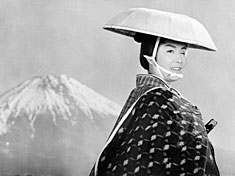 This tough-guy character was borrowed from kabuki theater as the subject of sundry feature films, television shows, anime & video games about medieval gamblers. Hibari plays "him" as an eighteen year old rowdy with good heart but short temper. This tough-guy character was borrowed from kabuki theater as the subject of sundry feature films, television shows, anime & video games about medieval gamblers. Hibari plays "him" as an eighteen year old rowdy with good heart but short temper.
One of the most charming extended sequences is Ishimatsu's dream that he is Ushimaro of a well known fairy tale who road a sea-turtle to the land of a sea princess. In the undersea world, Hibari & Kotaro sing a couple big numbers that lean in the direction of Busby Berkley, at one point dancing through the Dragon Palace to Ravel's Bolero. It'll obviously thrill kids, but the whole dream is so sweetly bizarre it'll delight anyone.
When the dream is done, it's back to the rough-&-tumble world of the one-eyed wandering adventurer, simply one of her best male roles with plenty of opportunity for tough talk & fight action, while bonding with get a young blind princess Ishimatsu struggles to transport home to safety with assassins in pursuit. The climactic battle of swords takes place mainly in a bowling alley, keeping it lighthearted even for violent sequences.
copyright © by Paghat the Ratgirl
|

